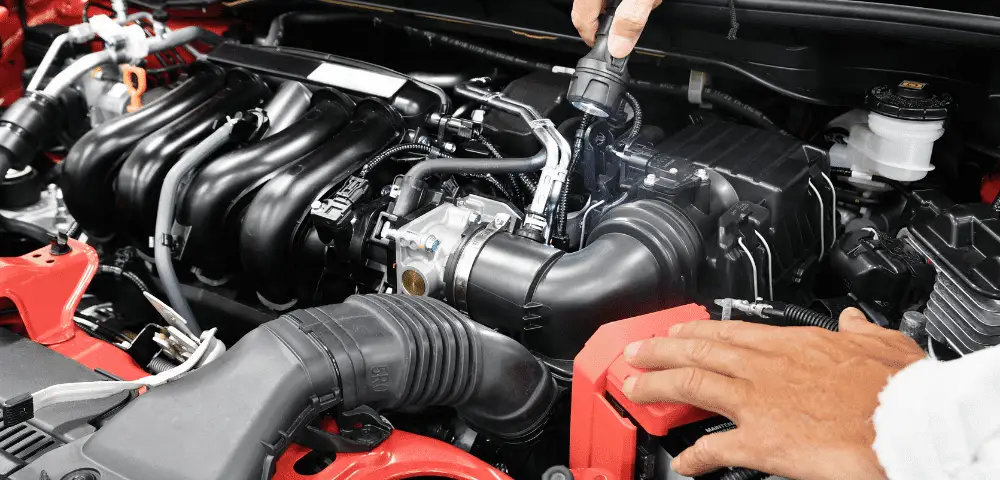Grinding or any unusual sounds coming from your car’s serpentine belt or engine is not at all a good sign.
It’s an indicator of something being wrong and should be immediately rectified for the safety of both the passengers of the car and other people on the road.
Generally, grinding noises coming from the car’s engine and transmission issues, and delaying the proper diagnosis and repairs can make the problem even worse.
So, what needs to be done in the case of a grinding vehicle? Why exactly does it happen and how safe is it to ignore it?
The following text will answer all your questions.
Why is My Car Producing a Grinding Noise?
Before getting on to what needs to be done about a grinding engine, it’s important to understand why it happens in the first place.
There are several reasons why your engine might be producing strange sounds or you hear a grinding or grinding noise from the engine.
In most cases, it’ll require no repair or a small adjustment if you catch it on time. However, it will almost always get worse if you ignore it and continue to drive on a bad engine.
Here are some of the main reasons why you might be hearing a grinding noise from your engine:
- Low oil pressure: When your engine doesn’t have enough oil, the metal parts of the engine can grind against each other.
- Worn bearings: Bearings allow different parts of the engine to rotate freely. When these bearings wear out, they can cause a grinding noise.
- Damaged or worn belts and pulleys: The belts and pulleys in your engine help power different parts, such as the alternator and air conditioning compressor. When these components wear out or become damaged, they can cause a grinding noise.
- Damaged flywheel: The flywheel in your engine helps transfer power from the engine to the transmission. A worn-out flywheel can grind with other parts of the engine and cause noise.
- Faulty engine mounts: Engine mounts are what hold your engine in place. If these mounts become worn or damaged, they can allow the engine to move around, causing a grinding noise.
- Worn camshaft: The camshaft is what controls the opening and closing of the engine’s valves. If the camshaft becomes worn, it can cause a grinding noise.
- Faulty water pump: The water pump helps circulate coolant throughout the engine. Any fault in it can lead the engine to grind after heating up.
What to Do Next?
Now that you know why engines make that grinding noise, it’s time to discuss what to do when it happens. Not to sound like a broken record, but it’s essential that you address the source of the grinding noise as soon as possible.
Not doing so can completely destroy your engine and it’s important to address the issue as soon as possible to avoid worsening the existing issue.
Every problem requires a different approach but engine grinding can only happen because of a limited number of reasons.
Here are a few steps you should immediately take while dealing with a grinding engine.
1. Identify the source of the noise
The first step in dealing with a grinding noise from the engine is to identify where the sound is coming from. You can start by opening the hood of your car and listening carefully.
Is the sound coming from the front of the engine, the back, or the sides?
Is it a constant noise, or does it happen only when you accelerate or decelerate?
Ask all these questions. The more you know, the better understanding you’ll have regarding the issue, and the more closer you will be to solving it.
2. Check the oil level
A grinding noise from the engine can be a sign of low oil pressure.
Engine oil is responsible for lubricating the engine and keeping all the moving parts from grinding with each other. If your oil level is low, simply add more from the top and work on figuring out why.
Generally low oil levels indicate a leak in the system or a clogged-up oil filter, both of which can be quickly rectified.
Sometimes, an issue in the cooling system or a worn-out head gasket. The oil level would significantly drop in both cases and you’ll have to rush to get your car repaired as both issues are too dangerous to neglect.
3. Inspect the belts and pulleys
Another potential cause of loud grinding noise from the car or engine is a problem with the belts faulty wheel bearings or pulleys.
Check the belt’s bad wheel bearing for any signs of wear or damage, and make sure that they have the proper tension.
Similarly, inspect wheel bearings and the pulleys worn out the wheel bearing for any uneven tire wear or damage, and make sure they’re properly aligned.
4. Check the engine mounts
If your front engine mounts are worn or damaged, they can cause a grinding noise when the engine or wheel is running.
Generally, engine motor mount and wheel motor mount will not wear out too soon, but exposing them to warm weather, harsh chemicals, or accelerating too much on uneven terrain cause them to deteriorate much faster.
Regularly check your engine mounts for any signs of wear or damage, and replace them if necessary.
5. Consult a professional mechanic
If you’re unable to identify which power source of your vehicle or car makes the grinding noise, or if you’ve identified the problem but don’t feel comfortable fixing it yourself, it’s time to consult a professional mechanic.
They can diagnose the vehicle or problem and recommend the appropriate repairs.
Key Takeaways
A grinding noise from the engine is a sign of a potential problem, and it’s important to address it as soon as possible. Ignoring it will only make things worse and cause further issues down the line.
The best way to get ahead of the issue is by identifying the source, checking your oil level, inspecting the belts, and pulleys, checking the engine mounts, and finally consulting a professional mechanic.
The steps may sound simple but they can help in keeping your car’s transmission running smoothly and avoiding costly repairs down the line.


